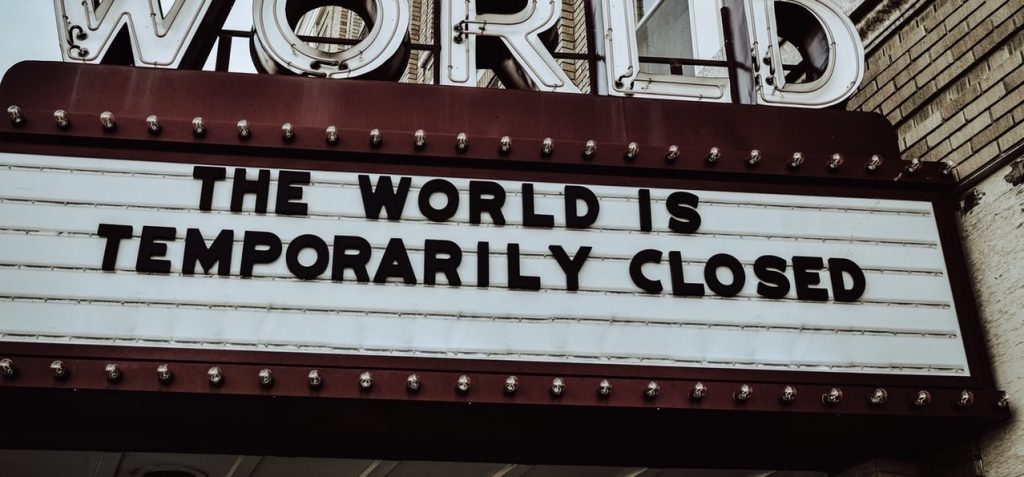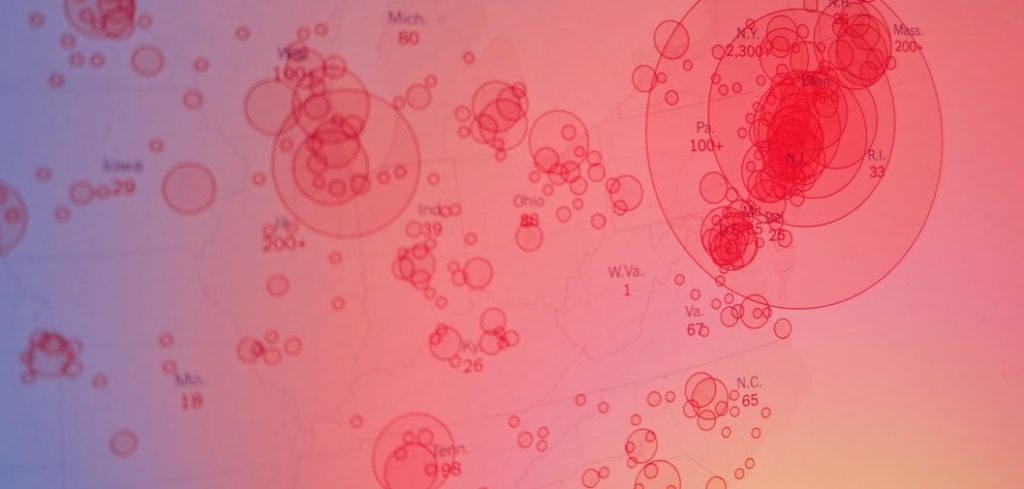A Losing Battle
In this time of untold uncertainty, the world is failing to get a grip of the Coronavirus pandemic. As societies across the globe gear up for containment, government officials have rallied their citizens to hunker down as if to prepare for the Blitz. The war-time-like rhetoric of the world’s leaders is fitting as the crisis is unrivalled in terms of its effect on economies, healthcare systems and human adversity. Indeed, the crisis comes during a period where global tensions run high and the global alliances that the world looks to are faltering. Despite the political oratory, the economic collateral of the contagion is not like mass-scale conflict. In a substantial contrast to the mobilisation one expects during war time, policies are shifting to deal with the slowing economies of the international spectrum with the overarching theme being lockdown as it forces countries to close borders, workplaces and public areas. It is a telling moment in modern history and no one can know what the crisis will leave in its wake.
As this short article will explain, dependable leadership in times such as these is a necessity. However, it is clear that our initial global response has been weak, characterised by cover-ups, propaganda and indecisiveness. What’s more, the severity of the contagion has led elite level leadership to close off and care for the needs of their own nations in a very segmented manner, all while global institutions and alliances are seemingly hamstrung and silent. Yet in an era of near unfathomable interconnectivity this must not be the case. Despite the detached and nationalistic nature of today’s global relations, the world will only get through this if done so together. After all, the Coronavirus and the disease it causes are a common enemy.

A Certain Inevitability
This is by no means the first pandemic and the present crisis is, to some extent, a case of déjà vu. One only has to consider the deadliness of the Spanish Flu pandemic (1918-1919) to realise the potential for world-wide calamity. With its spread facilitated by the returning troops from the Great War, the 1918 pandemic caused more fatalities than both world wars combined. With today’s vastly bigger population and our incredible means to travel, it was not a matter of if, but when a pandemic like the Coronavirus would hit. We should have been better prepared and one only hopes that humanity at large will take this new virus as a wake up call.
Inept Governance and Relations
From Europe to the Americas, the Coronavirus is proving to be an exceptional ordeal for the parts of the world that have typically led in such times of crisis. As covered by Cookson and Peel, Professor Mauro Ferrari -the EU’s top scientist- has resigned after failing to create a scientific body specialised for combatting the pandemic, slating the Union for: “the complete absence of coordination of healthcare policies among member states, the recurrent opposition to cohesive financial support initiatives, the pervasive one-sided border closures” (2020). Such gripes echo with the feelings in Washington and the dumbfoundedly poor response from the global north is alarming.

The political reaction seems especially sporadic when compared to the Ebola outbreak in 2014, where a consensus was reached at the G-20 in Brisbane to take collective action to contain the crisis (Jain, 2020). During the Ebola crisis, aid in the form of medical teams and vital equipment was sent to West Africa, along with a bespoke fund to support the region consisting of poorer countries vulnerable to it. In comparison, very little has been done to counter the present crisis. No doubt the Coronavirus has affected the world in a far wider scope, yet as many countries have not reached the peak phase of the virus and those that have, face a potential second wind of infection, more coordination is paramount. As Mesfin asserts: “Infectious diseases, it is commonly said, know no borders, and neither does the knowledge needed to fight them” (2020). While speaking more about scientific research, such an argument must extend to leadership. Global health issues are national health issues in this era of interconnectivity and so the response must be international. The only path forward is for states to mobilise behind the institutions that secure them in unforeseen crises such as this.
A Tilting Pendulum
Since Trump and his Secretary of State, Mike Pompeo, continue to attempt to brand the Coronavirus as the ‘Wuhan Virus’, it is clear that the fractures in global relations will persist. The fact that the U.S. has only harshened sanctions on Iran and enforced a new effort to remove Venezuelan President Nicolás Maduro highlights the administrations neglect for producing an international response based on collective action to stopping the transferral of the virus. These pre-pandemic policies will not only greatly diminish the abilities for the state’s in question to combat the virus themselves but proliferate fear and hinder dialogue. The U.S. has been the main pillar of the liberal order and without its leadership, the West is failing to tackle not only the crisis at issue, but maintain the dynamic set of institutionally aligned arrangements that global governance are based on.

Meanwhile, China is looking to fill the void left by the west’s impotence. China is now far safer from Covid-19 than the new epicentres of the virus and Xi has miraculously emerged as a stronger leader, at home and abroad. Indeed, the autocrat has just announced a $7 trillion aid package to support China’s GDP alongside his Belt & Road Initiative. As Haass regards:
[China aims] to portray itself as offering a successful model for coping with the pandemic and to use this moment as an opportunity to expand its influence around the world
2020
With the current state of affairs, this could be the tipping point. Either way, the ongoing tensions between the two main powers in today’s sphere are severely hampering the global response to the pandemic. While these two behemoths play the blame game with one another, the crisis worsens
A Global Critical Juncture
The world order as we know it is faltering and with this fact comes a new era of multipolarity. Such a world will be far more dangerous than the one we have known for the past 30 years. This is not a new assertion, however, the Coronavirus is a recent and consequential development. While what the virus will connote for the international system is uncertain, it brings further clarity to the current fractures of international relations. The virus threatens to accelerate the rupture of the international order and the next few years will be telling. With this in mind, we are now positioned at a greatly important juncture. One where a great power needs to rise to the moment to provide good global leadership and governance.

Coronavirus in the UK
From looking at parts of Italy as a case study for what works to combat the contagion, specifically preventing deaths, keeping people away from hospitals is consequential as a preliminary action to fighting COVID-19 with emergency care. Moreover, hospitals all over the globe have (and will continue to) receive an influx of people affected by the virus. There are two main implications for this. Firstly, the fact that unaffected patients are highly likely to be exposed to the virus if they are admitted to or remain in hospital. Further, healthcare workers are put in greater danger of contracting the virus as they become more exposed to it. Protecting high risk groups and healthcare works must be at the forefront of any government policy during this crisis.
To bolster the defences against the virus in the capital, where the UK has been hit worst, the ExCel Arena has been transformed into the country’s largest hospital. A number of similar projects are underway in the fear that the NHS, the UK’s publicly funded healthcare system, will become overwhelmed as more people contract COVID-19. These preemptive measures will undoubtedly save thousands of lives, yet stopping the virus spreading and keeping people away from the hospitals is the best counteragent before a long term remedy is made available. With this in mind, the government’s advice must be heeded. Stay at home.
References
Cookson, C. and Peel, M. (2020) ‘EU science chief resigns with blast at coronavirus response’, Financial Times. Available at: https://www.ft.com/content/f94725c8-e038-4841-a5f6-2e046ae78e95 (Accessed: 8th April 2020).
Haass, R. (2020) ‘The Pandemic Will Accelerate History Rather Than Reshape It’, Foreign Affairs. Available at:https://www.foreignaffairs.com/articles/united-states/2020-04-07/pandemic-will-accelerate-history-rather-reshape-it (Accessed: 11th April 2020).
Jain, A. (2020) ‘Trump Just Missed a Perfect Opportunity to Reassert American Leadership’, Foreign Policy. Available at: https://foreignpolicy.com/2020/04/02/g20-helped-beat-ebola-but-not-coronavirus/ (Accessed: 6th April 2020).
Lewis, L. and Inagaki, K. (2020) ‘Japan risks second coronavirus wave as hygiene fatigue sets in’, Financial Times. Available at: https://www.ft.com/content/194d488d-952a-41bc-8a96-0cd67e2f3b52 (Accessed: 5th April 2020).
Mesfin, M. (2020) ‘It Takes a World to End a Pandemic’, Foreign Affairs. Available at:https://www.foreignaffairs.com/articles/2020-03-21/it-takes-world-end-pandemic (Accessed: 9th April 2020).
Disclaimer
The opinions expressed in this publication are those of the author. They do not purport to reflect the opinions or views of IVolunteer International.
IVolunteer International is a 501(c)3 tech-nonprofit registered in the United States with operations worldwide. Using a location-based mobile application, we mobilize volunteers to take action in their local communities. Our vision is creating 7-billion volunteers. We are an internationally recognized nonprofit organization and is also a Civil Society Associated with the United Nations Department of Global Communications. Visit our profiles on Guidestar, Greatnonprofits, and FastForward.


